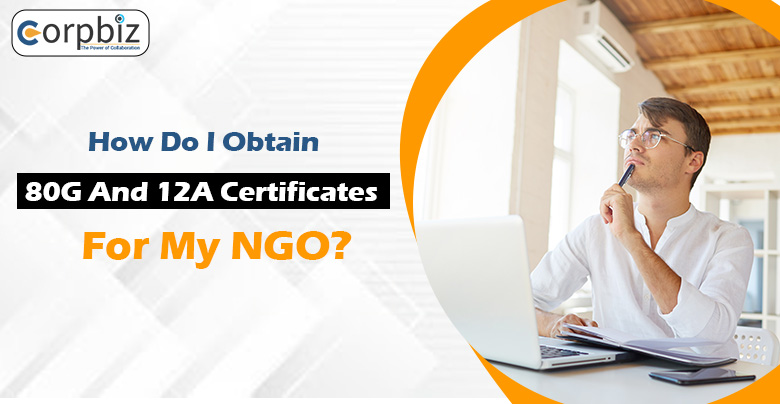The procedure of obtaining 80G and 12A certificates is required for charitable trusts and institutions in order to be eligible for tax exemptions under the Income Tax Act 1961. Donors can claim tax deductions for the donations given to the NGO. And can also exempt them from paying taxes on its revenue. NGOs or Non-Governmental organizations are eligible for certain tax exemptions and benefits in India. NGOs or Non-Governmental organizations are critical to the growth and welfare of the society. These organizations are often non-profit and run independently of the government; they are committed to helping a specific cause in the community. It is crucial that these companies receive 80G and 12A certificates from Income Tax Department in order to verify their credibility and legitimacy. For getting 80G registration, 12A registration is a compulsory part.
What Is An 80G And 12A Certificates?
- 80G Certificate:
The income Tax Department of India issues an 80G certificate toNon-Governmental organizations (NGOs) that are registered as trusts or societies. With the help of this certificate, donors can claim tax exemptions on their donations made to the NGO. This indicates that a donor can deduct the amount of their donations from their income taxes when they give to an NGO that has an 80G certificate.
Section 80G of the Income Tax Act of 1961 authorizes the issuance of an 80G certificate. By offering them a tax advantage, this certificate seeks to persuade people and corporations to donate to qualified NGOs. The goal of this tax deduction is to promote more significant donations to the NGO, which may then be put towards a variety of causes and initiatives.
What is 12A Certificate?
12A registration is the initial step for non-profit organizations to obtain an exemption from the internal revenue service. 12A registration provides as an official proof of the NGO’s existence and assists it in receiving clearance from governments as well as an international organization.
The NGOs or Non-Governmental Organization also have incomes; if they are not registered under section 12A of the income tax act, they must pay the taxes at the regular rates.12A exempts from paying income tax based on the registration, trusts, NGOs, and other section 8 entities. NGOs. It is a one-time registration, and it exempts from paying income tax.
Benefits of Obtaining 80G and 12A Certificates
The following are the benefits of obtaining 80G and 12A Certificates:
- Tax Benefits:
One of the primary advantages of an 80G certification is that it enables contributors to deduct the donations from their taxes. Section 80G of the Income Tax Department allows for tax exemptions for donations made to organizations that have earned their 80G certifications.
- Trust and Credibility:
Donors are more likely to trust and believe in an organization that has earned an 80G accreditation. This helps to attract more support and donations to the organization’s cause.
- Increased Visibility:
The income Tax Department’s website lists the 80G recognized organizations which can help people find and learn about the work they do.
- Eligibility of Government Grants:
The 80G certified organizations are the only ones eligible for several government grants and programmes. Getting an 80G certification may lead to more financing and assistance options.
- Improved Accountability and Transparency:
Organisations with an 80G certificate are required to submit frequent reports and keep accurate financial and activity records. This promotes openness and accountability in the utilization of funds.
- Reputation and Prestige:
The 80G certification is a prestigious achievement for an organization and can assist in increasing its credibility and reputation.
- Long-Term Sustainability:
Because of the 80G certified organizations have access to a consistent flow of financing and assistance; they are more likely to be sustainable in the long run.
- Help In Achieving The Organizational Goal:
Given the increased resources at their disposal, organizations with 80G certification may accomplish their objectives more quickly and efficiently.
- Contribution To Social Welfare:
Organizations that have earned the 80G certificates are recognized for their efforts to improve society by receiving the certification.
Conditions to Be Fulfilled To Be Eligible To Obtain 80G and 12A Certificates
Following are some conditions that need to be fulfilled to obtain 80G and 12A Certificates:
- The Non-Governmental Organisations (NGOs) must be registered as a trust/society.
- The Non-Governmental Organization (NGOs) must be legally registered in accordance with the Societies Registration Act of 1860, or under Section 25 of the Companies Act, or under any other relevant laws.
- Non-Governmental organizations (NGOs) must have a specific purpose/goal. The NGO should be actively involved in achieving this aim.
- The Non-Governmental Organisations (NGOs) should not be established under any political or commercial purpose.
- The Non-Governmental organizations (NGOs) must only use the donations for charitable purposes only.
- No income of the Non-Governmental Organization (NGO) should be exempted.
- If the Non-Governmental Organization (NGO) has some income generated from the business, then there should be separate books of accounts.
Application Process for Obtaining an 80G and 12A Certificates
Following is the application process for obtaining an 80G and 12A Certificates:
- Process for Obtaining 80G Certificate:
The application for the 80G certificate is processed by the Commissioner of the Income Tax Department. After which, a thorough and detailed inspection is carried out by the Income Tax Department. The documents that are required for the 80G certificate registration are as follows:-
- MoA/Trust deed – if the organization is registered as a trust.
- Registration certificate
- Form 10G
- A list of all the donors that are contributing to the organization
- All the necessary documents of the Income Tax Returns and the progress reports of the last three years.
- A list of the Board of Trustees
- Copy of PAN Card
- The No Objection Certificate by the owner of the property where the organization is established.
- The copy of the House Tax Receipt, Electricity Bill or Water Bill.
The commissioners can also further ask for some additional documents if required for further inspection.
- Application Process For Obtaining A 12A Certificate:
The documents that are required for the 12A certificate registration are as follows:-
- Form 10A
- MoA/AoA/Trust Deed (evidence of the creation of the NGO/Trust)
- The financial accounts for the last three years
- PAN Card
- If the company is incorporated under section 8 of the Companies act, then it needs to submit a certificate of incorporation along with MoA and AoA copies.
The applicant has to file Form 10A. After which, the Commissioner will verify the documents and do a thorough inspection. If the Commissioner sees it necessary, he may also ask for some other additional documents. If the Commissioner is satisfied with everything, then he grants the certificate. The 12A certificate can be cancelled anytime if it is found that the organization is not following any of the prescribed rules and regulations.
Conclusion
In conclusion, acquiring 80G and 12A certificates is an essential step in assuring an NGO’s validity and reputation. These certificates, which the income tax department gives, are required to show their legitimacy as legally recognized organizations and qualify for the contributors’ tax advantages. The Trust and confidence of the contributors, volunteers and other stakeholders may increase as a result. Additionally, possessing these credentials helps enhance the NGO’s accountability and openness. It demonstrates that the NGO is dedicated to abiding by the local rules and regulations, and the donations and income are used for the intended objectives. The NGO may become more trustworthy and reputable as a result of increasing its transparency with the general public. Like every coin has two sides, there are also some drawbacks to this provision. These tax exemptions are only limited to Indian laws, so there might be a possibility that other countries have different rules and regulations regarding the same matter. The income tax department has the power to revoke the certifications anytime they want if they find that the institutions are not complying with the prescribed rules and regulations.
Read Our Article: What Are The Benefits Of 12A And 80G Registration?











